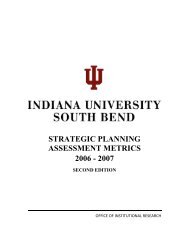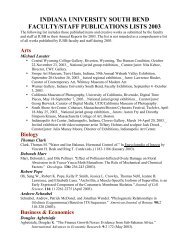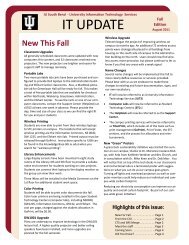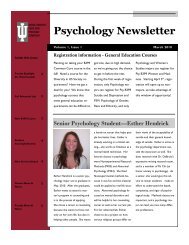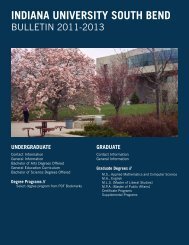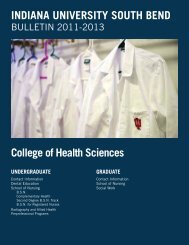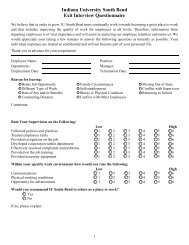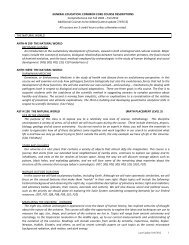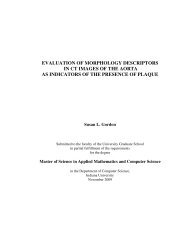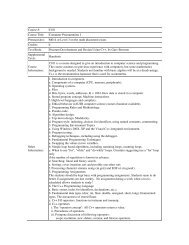Current version - Indiana University South Bend
Current version - Indiana University South Bend
Current version - Indiana University South Bend
You also want an ePaper? Increase the reach of your titles
YUMPU automatically turns print PDFs into web optimized ePapers that Google loves.
SUPPLEMENTAL AND PREPROFESSIONAL PROGRAMS 4 209<br />
Engineering<br />
Students interested in pursuing an engineering degree can<br />
begin their studies at IU <strong>South</strong> <strong>Bend</strong> in the Department<br />
of Physics and Astronomy. The department has dualdegree<br />
arrangements with engineering departments at<br />
other institutions, under which students can earn both a<br />
Bachelor of Science in Physics from IU <strong>South</strong> <strong>Bend</strong> and a<br />
Bachelor of Science in Engineering from the partnering<br />
institution, following at least three years of study at IU<br />
<strong>South</strong> <strong>Bend</strong> and two years of study at the partnering<br />
institution. More information about these 3/2 dualdegree<br />
arrangements can be found in the Physics and<br />
Astronomy section of the listing of undergraduate<br />
programs in the College of Liberal Arts and Sciences.<br />
Students interested in transferring to an engineering<br />
degree program without pursuing a physics degree from<br />
IU <strong>South</strong> <strong>Bend</strong> should consult the admissions office at<br />
the institution to which they hope to transfer.<br />
While specific requirements for transfer admission vary<br />
by institution, the courses listed below are required in<br />
most engineering degree programs. Specifically, they<br />
are required of students transferring into one of the<br />
professional engineering schools at the West Lafayette<br />
campus of Purdue <strong>University</strong>.<br />
(All courses are 3 credit hours, unless otherwise designated.)<br />
CSCI-C 101 Computer Programming I (4 cr.)<br />
ENG-W 131 Elementary Composition 1<br />
MATH-M 215 Calculus I (5 cr.)<br />
MATH-M 216 Calculus II (5 cr.)<br />
PHYS-P 221 Physics 1 (5 cr.)<br />
PHYS-P 222 Physics 2 (5 cr.)<br />
SPCH-S 121 Public Speaking<br />
Sequence 1<br />
CHEM-C 105<br />
CHEM-C 125<br />
Principles of Chemistry I<br />
Experimental Chemistry I (2 cr.)<br />
Sequence 2<br />
CHEM-C 106 Principles of Chemistry II<br />
CHEM-C 126 Experimental Chemistry II (2 cr.)<br />
A limited number of courses in the social and behavioral<br />
sciences or in the arts and humanities can generally also<br />
be applied toward the requirements of an engineering<br />
degree program.<br />
Students interested in taking course work in engineering<br />
at IU <strong>South</strong> <strong>Bend</strong> should contact the faculty advisor,<br />
Monika Lynker, in physics and astronomy soon after<br />
admission to IU <strong>South</strong> <strong>Bend</strong> to discuss an appropriate<br />
degree program.<br />
Law<br />
In the United States, students apply for law school<br />
admission after they have received a four-year bachelor’s<br />
degree (either a B.A. or B.S.) in a major of their choice.<br />
Following diverse paths to prepare themselves for law<br />
school, successful students come from all walks of life<br />
with diverse experiences and different courses of study.<br />
Students attend law school for three to four years and,<br />
when they complete their studies, most earn a juris doctor<br />
(J.D.) degree and then take a written bar examination in<br />
the state(s) or regions(s) in which they wish to practice law.<br />
Some common undergraduate degrees of students currently<br />
in law schools are political science, history, English,<br />
philosophy, psychology, criminal justice, and business.<br />
Many IU <strong>South</strong> <strong>Bend</strong> students also take a certificate or<br />
minor in paralegal studies, which further prepares them<br />
for law school admission and the legal profession. These,<br />
and many other majors and minors, help develop students’<br />
analytical and communication skills, including critical<br />
thinking, reasoning, writing and oral communication—all<br />
important skills for success in law school.<br />
To be admitted to law school, students must have a<br />
strong undergraduate cumulative grade point average<br />
and an acceptable score on the Law School Admissions<br />
Test (LSAT). The very best schools will only accept the<br />
top students.<br />
<strong>Indiana</strong> <strong>University</strong> has two law schools: <strong>Indiana</strong><br />
<strong>University</strong> School of Law-Bloomington and <strong>Indiana</strong><br />
<strong>University</strong> School of Law-<strong>Indiana</strong>polis; each has its<br />
own admissions requirements. Application forms for<br />
admission are available at:<br />
Office of Admissions<br />
<strong>Indiana</strong> <strong>University</strong> School of Law-Bloomington<br />
211 S. <strong>Indiana</strong> Avenue<br />
Bloomington, <strong>Indiana</strong> 47405-7001<br />
Office of Admissions<br />
<strong>Indiana</strong> <strong>University</strong> School of Law-<strong>Indiana</strong>polis<br />
735 West New York Street<br />
<strong>Indiana</strong>polis, <strong>Indiana</strong> 46202-5222<br />
Students interested in law school should obtain<br />
additional information about law schools from the Pre-<br />
Law Handbook published by Bobbs-Merrill and prepared<br />
by the Association of American Law Schools and the Law<br />
School Admission Test Council.<br />
For pre-law advising, student should call the Department<br />
of Political Science to make an appointment.<br />
Medicine<br />
A student is eligible for admission to the <strong>Indiana</strong><br />
<strong>University</strong> School of Medicine upon receipt of a<br />
bachelor’s degree (or in exceptional cases, completion<br />
of 90 credit hours of university-level courses; however,<br />
nearly all students admitted to the School of Medicine<br />
have a bachelor’s degree). A student who plans to apply<br />
to medical school may earn his or her bachelor’s degree<br />
in any major, but must complete the following courses<br />
prior to admission:<br />
(All courses are 3 credit hours, unless otherwise designated.)<br />
Biology (10 cr.)<br />
BIOL-L 101 Introduction to Biological Sciences<br />
1 (5 cr.)<br />
BIOL-L 102 Introduction to Biological Sciences<br />
2 (5 cr.)



